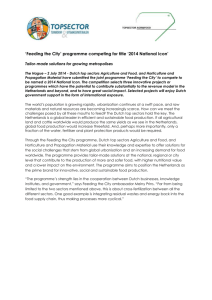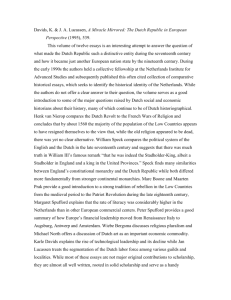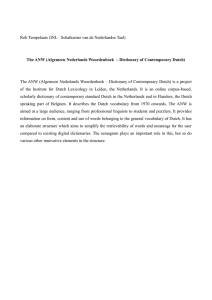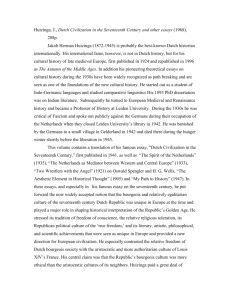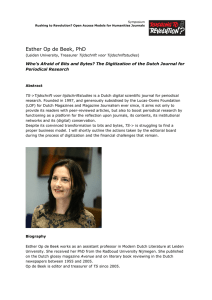The shared struggle: Issues faced by foreign teachers in the Dutch
advertisement
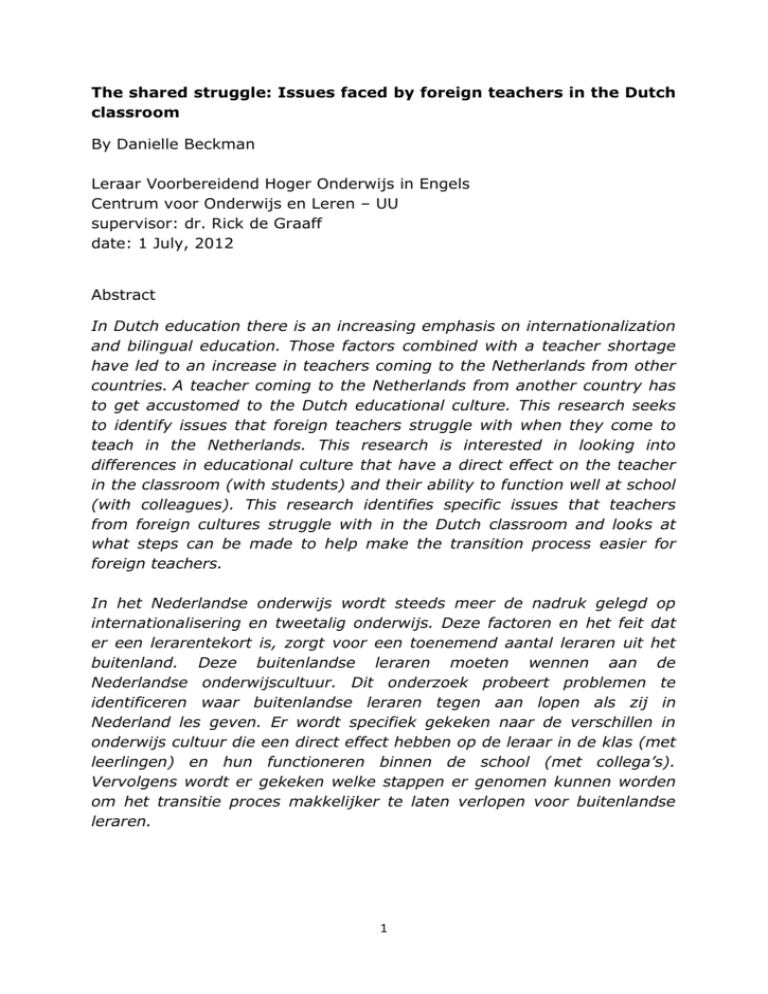
The shared struggle: Issues faced by foreign teachers in the Dutch classroom By Danielle Beckman Leraar Voorbereidend Hoger Onderwijs in Engels Centrum voor Onderwijs en Leren – UU supervisor: dr. Rick de Graaff date: 1 July, 2012 Abstract In Dutch education there is an increasing emphasis on internationalization and bilingual education. Those factors combined with a teacher shortage have led to an increase in teachers coming to the Netherlands from other countries. A teacher coming to the Netherlands from another country has to get accustomed to the Dutch educational culture. This research seeks to identify issues that foreign teachers struggle with when they come to teach in the Netherlands. This research is interested in looking into differences in educational culture that have a direct effect on the teacher in the classroom (with students) and their ability to function well at school (with colleagues). This research identifies specific issues that teachers from foreign cultures struggle with in the Dutch classroom and looks at what steps can be made to help make the transition process easier for foreign teachers. In het Nederlandse onderwijs wordt steeds meer de nadruk gelegd op internationalisering en tweetalig onderwijs. Deze factoren en het feit dat er een lerarentekort is, zorgt voor een toenemend aantal leraren uit het buitenland. Deze buitenlandse leraren moeten wennen aan de Nederlandse onderwijscultuur. Dit onderzoek probeert problemen te identificeren waar buitenlandse leraren tegen aan lopen als zij in Nederland les geven. Er wordt specifiek gekeken naar de verschillen in onderwijs cultuur die een direct effect hebben op de leraar in de klas (met leerlingen) en hun functioneren binnen de school (met collega’s). Vervolgens wordt er gekeken welke stappen er genomen kunnen worden om het transitie proces makkelijker te laten verlopen voor buitenlandse leraren. 1 Introduction As our world becomes increasingly globalized, it should come as no surprise that education is becoming more globalized as well. The Netherlands is no exception to this trend. In Dutch education there is an increasing emphasis on internationalization and bilingual education. Those factors combined with a teacher shortage have led to an increase in teachers coming to the Netherlands from other countries. As a foreigner coming to a new country, there is a whole new culture that one must become accustomed to. A new way of doing things. The same applies within the world of education. A teacher coming to the Netherlands from another country has to get accustomed to the Dutch educational culture. Teachers with foreign training and/or experience may be operating from a different knowledge base of education and have specific teaching and learning methodologies which might conflict with the Dutch system. As a teacher myself coming to the Netherlands, I struggled adapting to a new educational culture and in discussion with fellow expat teachers I came to realize that those teachers were struggling with many of the same issues as well. In addition to sharing similar struggles, we also shared the experience that our schools were generally unaware of the issues that we faced as new expat teachers and there was not system in place within the school to help us adapt/ prepare us for a different educational culture. This research, then seeks to identify issues that expat teachers struggle with when they come to teach in the Netherlands. While there are a number of practical issues that teachers face teaching in a new culture (a different educational structure, different rules and regulations, and other issues that come along with being a foreigner in a new land), this research is interested in looking into differences in educational culture that have a direct effect on the teacher in the classroom (with students) and their ability to function well at school (with colleagues). While there is an increase in foreign teachers, schools are not necessarily aware of the challenges that these international teachers will face. The aim of this research is to be able to identify common issues expat teachers struggle with so that Dutch schools that employ expat teachers can become aware of the issues that these teachers face and better be able to guide and support them in their transition to Dutch education. Theoretical Framework A major part of moving to a new culture is of course, learning how to adjust and adapt to a new culture that acts and reacts in ways that are 2 new or unexpected. Adapting to this new culture is an important part of being able to function successfully in or with that culture. Acculturation is a well-known concept first defined by anthropologists Redfield, Linton and Herskovits (1936): "Acculturation comprehends those phenomena which result when groups of individuals having different cultures come into continuous firsthand contact, with subsequent changes in the original culture patterns of either or both groups". Acculturation, then, is an issue which will be faced by teachers who go to teach in a foreign culture. They will be faced with a new culture both outside and inside of the classroom which will have an effect on the way that they function. Holliday (1994) looks at the issue of acculturation more specifically in the terms of how this will affect teachers in foreign cultures. He identifies a variety of cultures that foreign teachers must become acculturated with namely the cultures of: the nation, of the specific academic discipline, of international education, of the host institution, of the classroom, and of the students themselves. He goes on to say, “To be effective, expatriate teachers must take account of all these cultures and how they influence the attitude and study styles of their students. Instead of trying to impose cultures of their own, they must work with the cultures that they encounter” (29). So for teachers, then, this means to have an understanding of the educational culture that they will be teaching in. Looking further into literature on the acculturation process for teachers, we come across the idea of intercultural literacy which is how Heyward (2002) refers to the acculturation process necessary for expatriate teachers in international settings. He defines intercultural literacy as the understandings necessary for successful cross-cultural engagement (p.10). Heyward goes on to say: “The interculturally literate person, in these terms, possesses the understandings, competencies, attitudes and identities necessary for successful living and working in a cross-cultural or pluralist setting. He or she has the background required effectively to “read” a second culture, to interpret its symbols and negotiate its meanings in a practical day to day context” (11). Heyward points out that there are many different variables that play a role in becoming intercultural literate and to aid teachers in the acquisition of this literacy “educational and training interventions” could be very useful (15). So becoming accustomed to a new educational culture, then, is not something that teachers have to do on their own but it can be useful to have external support (i.e. trainings) in negotiating this new culture. The Dutch context 3 While there are a number of studies dealing with the acculturation issues that teachers face in foreign schools (Zhou et al (2008), Dooley (2001), Boyle (2010)), this research is nearly exclusively focused on Western nationals teaching in schools in developing countries or Eastern cultures. For the purposes of this research however, we were interested in research dealing with the acculturation of (mainly) Western teachers teaching in other Western countries and this research was surprisingly sparse. Grantham et al. (2007) encountered this same issue while carrying out their research project on acculturation of foreign teachers in the Netherlands. In their research, Grantham et al identified some of the major issues that foreign teachers faced while teaching in the Netherlands such as: the attitude and behavior of the students, language, clarity and interpretation of rules, and hierarchy. While they identified areas in which the teachers struggled they did not go into the specifics of what exactly those struggles were. What Grantham et al. also discovered was that there was very little support available for expat teachers while 62% of the teachers interviewed did not feel adequately adjusted to the Dutch educational setting. Grantham et al report: “When asked whether their first school in the Netherlands did anything specifically aimed at helping them adapt to the differences mentioned in the previous question, only 2 of the 29 respondents replied that yes, their first school in the Netherlands had done something specifically aimed at helping them adapt to these differences” (p.8) While in most cases there were no special support available for expat teachers, in the few cases where there was support offered to expat teachers this had a positive result (p.15). Grantham et al. concluded that there should be special trainings available to help make the acculturation process easier for foreign teachers coming to the Netherlands. A study sponsored by the Dutch government (SBO, 2011) looking into the issue of recruiting teachers from Germany and Belgium to come to the Netherlands due to a lack of teachers in the Netherlands, also acknowledged that differing educational cultures could serve as a hurdle for German and Belgian teachers in Dutch education, specifically mentioning the lack of hierarchy between students and teachers and the feeling of empowerment of the Dutch students. It was pointed out that these cultural differences could make it difficult for some German and Belgian teachers to succeed in the Netherlands. Research Question The main question that this research seeks to answer is: 4 Which of the following topics umbrella specific issues which are shared by expat teachers in the Netherlands: - Behavior Attitudes Methods Hierarchy Language General cultural differences Methods and tools Participants The three preliminary interviews were carried out with three separate teachers from different countries: America, Britain and France. All of these teachers were teaching at different schools in the Netherlands. The questionnaires were distributed electronically to expat teachers teaching in the Netherlands. A teacher was in this case considered an expat if they are not Dutch and grew up and completed their schooling outside of the Netherlands. Due to the fact that there is no database identifying these teachers, professional (TTO schools, British Council, German teachers in training) and personal connections were used to identify potential informants who were then sent a mail explaining the purpose of the research and a link to the online questionnaire. While over 40 teachers were sent the questionnaire, 19 questionnaires were filled in and returned. The countries of the participants and the subjects they teach are shown in table 1 and 2. Table 1: Nationality of respondents Nationality # of respondents American 4 British 4 Canadian 2 French 1 German 4 Australian 1 Russian 1 Norwegian 1 Spanish 1 5 Table 2: Subjects taught by respondents Subject taught # of respondents English 9 French 1 German 4 Physics 1 Spanish 1 Mathematics 2 Science 1 Questionnaire For this research a questionnaire was developed. The questionnaire aimed to cover 6 specific areas that were mentioned to be areas of struggle for expat teachers in the work of Grantham et al. and SBO. Those topics were: • • • • • Behavior Attitude Methods hierarchy language general cultural differences The questionnaire consisted of 6 open questions (see Appendix A). This allowed the teachers to share the issues that were most prevalent for them giving allowing for a clearer picture of exactly what issues teachers struggle with. In addition to the open questions participants were also asked to provide their country of origin, mother tongue and the subject that they teach. After developing the questionnaire three interviews were conducted with expat teachers in the Netherlands using the questionnaire as an outline. After those interviews, the questionnaires were slightly adapted with feedback from the participants to improve the clarity of the questions. Specifically extra clarification was added to show what possible kind of topics were intended to be covered by that question. For example, the question for hierarchy originally read: Was the expected student-teacher 6 relationship different that you were accustomed to. In the interviews the respondents had difficulty understanding what exactly was meant by this question. Therefore more information was added to the question as suggested by the interviewees. The new question read as follows: Was the expected student-teacher relationship/interaction different than you were accustomed to (i.e. hierarchical relationship)? If so, how? The questionnaire was distributed and completed electronically. It was possible to complete the survey in English or in Dutch. This option was important as some foreign teachers (particularly in bilingual schools) do not speak fluent Dutch, and vice versa, not all foreign teachers are fluent in English. Therefore offering the questionnaire in both languages increased the pool of possible respondents. See Appendix A for the full questionnaire. Analysis Upon receiving the returned questionnaire the answers were categorized into the 6 themes mentioned above, and the specific issues mentioned by the teachers were isolated in order to be able to identify common/recurring issues. Issues that were mentioned more than once were identified as being relevant. As the questions were all open questions, the respondents would mention the issue(s) that were most relevant to them and not an exhaustive list of all the issues they faced. Therefore a response was seen as relevant if it was mentioned more than one time as this shows that it is not strictly an individual issue and it is possible that others struggled with this topic as well even if it was not their largest issue. Results Behavior On the questionnaire respondents were asked: “Was the behavior of the Dutch students in the classroom different than what you were accustomed to/expecting? If so, please explain.” 17 of the 19 respondents reported that they had issues with the behavior of Dutch students. There were three specific issues that came up: directness (11x) pushing boundaries (9x), and unpreparedness (no books, no homework, etc.) (6x). On the issue of directness a respondent said that she was taken aback by the “no nonsense” attitude of the students. “If I asked them to get started on an assignment and they did not see the benefit in doing the work or would rather do something else, they would simply say that. They preferred to use class time to socialize with friends and not work and seemed to think 7 this was an acceptable option.” Concerning pushing boundaries, one teacher wrote: “The students seem to think that everything is a negotiation. Every instruction that I gave seemed to turn into a negotiation process. I found this very difficult in the beginning.” Attitude On the questionnaire respondents were asked: “Was the attitude of the Dutch students toward education and/or learning different than what you were accustomed to/expecting? If so, please discuss what was different.” 17 of the 19 respondents on the questionnaire reported that they did have initial struggles with the attitude of the Dutch students. The most common issue that came up was related to the lack of motivation of the students. Specific issues that were mentioned were motivation for grades(10x), and that students did not take deadlines seriously(8x). One teacher wrote that her students thought that “a deadline is not really a deadline, more of a guideline.” Concerning grades, a common response was that Dutch students go for a 5,5 and are not motivated to earn a higher grade. One respondent said “…most students find it most rewarding to simply know that they have "passed." Dutch students are very likely to play triage with their grades, giving limited or no attention to courses that they know that they are going to pass.” Also in relation to grades it was mentioned by that students were only motivated to work if there was a grade attached to the assignment. Teaching methods The respondents were asked the following question: Were the teaching methods that you were accustomed to using different than what the school and/or students were accustomed to? If so, please explain how your methods were different. For this question 14 respondents mentioned that this was an issue for them. The issues were that were mentioned were: lack of creativity(x5), lack of preparation(x4), tests(x3),and lack of structure (x3). One teacher said that she felt she was viewed as very strict and “too serious” by her students and some of her colleagues for her approach to teaching. Another responded: “I am frustrated by the nonchalance with which some Dutch colleagues approach learning...I find here there is less emphasis on structure and accountability than in America.” Hierarchy On the questionnaire the respondents were asked: “Was the average student-teacher relationship/interaction in the school different than you 8 were accustomed to (i.e. hierarchical relationship)? If so, how?” The issue of hierarchy, specifically the lack of it, was an issue that was shared by nearly all of the respondents (18). Specifically mentioned here was the issue of respect for the teacher. A British respondent replied: “I noticed right away that the power distance between teacher and student is much smaller than in Britain; here instead of automatically warranting respect as a teacher, you need to EARN it.” Another respondent reported: “I am used to students having an automatic level of respect (or even fear) of the teacher. I think for Dutch students that is not the case.” Language On the questionnaire the respondents were asked: Was your ability to speak Dutch (fluency, accent, etc.) an issue in your teaching or with your colleagues? If so, please explain. For this answer there was a clear distinction between those who spoke fluent Dutch and those who did not. All of the respondents who said that they had issues with speaking the language were native English speakers who did not speak Dutch or did not speak it fluently (7x). The area in which these respondents struggled was not in the classroom but rather with colleagues. These colleagues struggled because they couldn’t/didn’t feel comfortable communicating with their colleagues in Dutch and there were colleagues who had the same issues about communicating in English. One respondent said in her interview that she felt that there were a number of colleagues who were “threatened/ irritated/ uncomfortable” with the fact that he could only communicate in English. Another respondent wrote about her struggles trying to communicate in Dutch at school: “When I speak Dutch to a colleague to whom I normally speak English, s/he reacts in one of two ways: (1) corrects me, thus making me feel small; (2) claps and praises me in the style of a three year old child, thus making me feeling even smaller. The language is probably the one area I struggle with most at school.” General Cultural Differences On the questionnaire respondents were asked: Were there general cultural differences that were a problem for you in the classroom or with your colleagues? Please explain. 9 respondents stated that there were general cultural differences (not related to any of the topics already mentioned) that they struggled with at school. There were a number of different issues including: sloppy dress (of students and colleagues) (3x), disregard for colleagues (3x), cursing (3x) time spent at work(x2) and lack of parent involvement (x2). The other respondents then did not encounter general 9 cultural differences that they felt to be an impediment to their teaching or work at school. So, while all foreigners undoubtedly encounter cultural differences, these differences did not seem to be a big issue in the educational setting for expat teachers. Table 3: questionnaire results Various issues respondents struggled Yes No with(yes)/ didn’t struggle with (no) issues with behavior 17 2 Issues with students attitude towards school/ learning 17 2 Issues with teaching methods 14 5 Issues with hierarchy 18 1 Issues with language 7 12 Issues with general cultural differences 9 10 Discussion The results indicate that not only are there general categories that foreign teachers struggle with (as mentioned by Grantham et al. and SBO ) but there also seem to be shared specific issues - like lack of hierarchy, directness of students, motivation for learning, proficiency in Dutch - that foreign teachers in the Netherlands struggle with. This information can be very useful in preparing future foreign teachers for the Dutch educational culture. As Holiday and Heyward mention an important part of acculturation for foreign teachers is gaining information about the culture of their students and schools. If teachers can be made aware of what is typical in Dutch educational culture, and more specifically identify potential struggles they will face in this culture, perhaps they will not have as great of a struggle in “reading” ”(in Heyward’s terms) the culture, as they will already be aware of some of the main issues they will encounter. This information is not useful for the foreign teachers alone, however. Looking back to the definition of acculturation, we see that acculturation can be a mutual process. So not only should the foreign teacher acculturate to the new educational culture, but the new school can also play an integral role in the process by acculturating themselves with the foreign teacher and the educational culture she brings with her. This not only will help the school to better be able to understand the foreign colleague but also be able to better guide and support her in her role at a new school and in a new culture. 10 As established by the study of Grantham et al., foreign teachers in the Netherlands could greatly benefit from more support in preparing them for the Dutch classroom. This study further supports that idea by showing that there are specific issues which many foreign teachers in the Netherlands struggle with. Interesting to look at then is how this information could practically be used to aid the acculturation process of foreign teachers. I think an excellent place to begin would be to have a training or orientation available for new foreign teachers and a counterpart from their school in the Netherlands. While there are trainings available that are associated with specific educational programs, not all foreign teachers have the opportunity to follow these trainings or are aware of their existence. The European Platform does offer programs for native speakers of German and French teaching in the Netherlands but I have been told that those programs focus more on the general cultural differences and do not go in depth on differences in educational culture. Also, those programs are of course reserved for German and French speaking foreigners, leaving a large audience of foreign teachers from other countries unreached.. Using the issues discussed in this research as a basis, an orientation program then could prepare the new teachers for the new educational culture by giving specific examples of challenging issues they might face. In addition these trainings could give them the support they need at school by having a colleague who also understands the specific issues that this teacher may struggle with. Given that the European Platform is very involved in internationalization in education and has contact with a lot of foreign teachers who come to teach in bilingual education, and the fact that they already offer a form of cultural training for native German and French speakers, this could be a good institution to facilitate such a training. Important, however, is that all schools are made aware of this training and not only schools associated with specific programs. I think it is important to mention that all of the focus of this research was on struggles that foreign teachers face. Certainly there are also positive aspects to the Dutch educational culture, but that was not the concern of this research. Also, this research was not without limitations. First of all the number of respondents from English speaking countries was dominant. This could then lead to issues that were more a result of specific cultural differences and would not be relevant for foreign teachers from other cultures. In addition, it would have been useful to ask the respondents which issues 11 were most relevant/ persistent for them. This could have provided relevant information on which topics would be most relevant to cover in a training or in future research. Also, the number of respondents is smaller than hoped for making these results less reliable. It would be useful if further research was done which quantitatively tested how relevant the issues identified on this survey were. Those results could then be controlled for specific cultural differences of the participants to show which issues are relevant across cultures and which issues are perhaps culture specific. Conclusion Adapting to a new culture is always difficult, but for foreign teachers this is especially the case, for not only do they have to adapt to a new general culture, they have to adapt to a new educational culture as well. This study shows that there are specific common issues faced by foreign teachers in the Netherlands. This information can be used to better prepare these teachers for the challenges that await them and help the schools to understand and support these teachers through the acculturation process. Bibliography Biggs, J. (2001) Teaching Across Cultures Student Motivation: The Springer Series on Human Exceptionality, Part III, 293-308. Boyle, J. (2010) Native-speaker Teachers of English in Hong Kong Language and Education, 11 (3): 268-278. Cambridge, J. and J.J.Thompson (2004) Internationalism and globalization as contexts for international education Compare: A Journal of Comparative and International Education, 34(2): 161-175 Dooley, K. (2001) Re-envisioning Teacher Preparation: Lessons from China Journal of Education for Teaching: International research and pedagogy,27(3), 241-251. Grantham, T., C. McCarthy and S. Pegg (2007) Acculturation of Foreign Teachers into the Dutch Bilingual Education System Master thesis, Utrecht University. retrieved 13 May 2012 from: http://igitur-archive.library.uu.nl/student-theses/2007-0810201121/UUindex.html Hayden, M. and J. Thompson (1995) International schools and international education: A relationship reviewed Oxford Review of Education, 21(3). Heyward, M. (2002) From International to Intercultural: Redefining the 12 International School for a Globalized World Journal of Research in International Education, 1:1, 9-32. Holliday, A. Appropriate Methodology and Social Context Cambridge: Cambridge University Press; 1994. Howe, E. R. (2005) Japan's Teacher Acculturation: Critical Analysis through comparative ethnographic Narrative. Journal of Education for Teaching, 31:2. Sowden, C.(2007) Culture and the ‘good teacher’ in the English Language classroom ELT Journal, 61 (4): 304-310. SBO (2011): Lerarentekort aanpakken via werving in buurlanden? Wervingsmogelijkheden in Duitsland en Vlaanderen voor Nederlandse scholen in het voortgezet onderwijs. Retrieved May 7 2012 from: http://www.onderwijsarbeidsmarkt.nl/publicaties/2011q1/lerarentekort-aanpakken-via-werving-in-buurlanden/ Redfield, R., R.Linton and M.J. Herskovits (1936). Resolving social conflicts. New York: Harper & Row. Zhou, J., Snape, Topping & Todman (2008) Theoretical models of culture shock and adaptation in international students in higher education, Studies in Higher Education, 33:1, 63-75. 13 Appendix A: Questionnaire Text International teachers in the Dutch Classroom The purpose of this questionnaire is to gain information about issues that expat teachers struggled with when they began teaching in a Dutch school, specifically looking at the issues that occurred within the classroom setting and with colleagues. Therefore when answering the questions please think back to your initial experiences teaching in a Dutch school. Your feedback is highly valued and hopefully this information can be used to help prepare future expat teachers for the transition into the Dutch classroom. There are 8 questions in this questionnaire. Please complete all questions and give examples to support your answers where possible. 1. Please provide the following general information: country of origin, subject that you teach, native language. 2. Was the behavior of the Dutch students in the classroom different than what you were accustomed to/expecting? If so, please explain. 3. Was the attitude of the Dutch students toward education and/or learning different than what you were accustomed to/expecting? If so, please discuss what was different. 4. Were the teaching methods that you were accustomed to using different than what the school and/or students were accustomed to? If so, please explain how your methods were different. 5. Was the average student-teacher relationship/interaction in the school different than you were accustomed to (i.e. hierarchical relationship)? If so, how? 6. Was your ability to speak Dutch (fluency, accent, etc.) an issue in your teaching or with your colleagues? If so, please explain. 7. Were there general cultural differences that were a problem for you in the classroom or with your colleagues? Please explain. 14 8. Are there any other issues that you struggled with as a foreign teacher in the Dutch classroom that were not dealt with above? If so, please share. 15


